The Intel Core i9-9900KS Review: The 5 GHz Consumer Special
by Dr. Ian Cutress on October 31, 2019 10:45 AM ESTCPU Performance: Encoding Tests
With the rise of streaming, vlogs, and video content as a whole, encoding and transcoding tests are becoming ever more important. Not only are more home users and gamers needing to convert video files into something more manageable, for streaming or archival purposes, but the servers that manage the output also manage around data and log files with compression and decompression. Our encoding tasks are focused around these important scenarios, with input from the community for the best implementation of real-world testing.
All of our benchmark results can also be found in our benchmark engine, Bench.
Handbrake 1.1.0: Streaming and Archival Video Transcoding
A popular open source tool, Handbrake is the anything-to-anything video conversion software that a number of people use as a reference point. The danger is always on version numbers and optimization, for example the latest versions of the software can take advantage of AVX-512 and OpenCL to accelerate certain types of transcoding and algorithms. The version we use here is a pure CPU play, with common transcoding variations.
We have split Handbrake up into several tests, using a Logitech C920 1080p60 native webcam recording (essentially a streamer recording), and convert them into two types of streaming formats and one for archival. The output settings used are:
- 720p60 at 6000 kbps constant bit rate, fast setting, high profile
- 1080p60 at 3500 kbps constant bit rate, faster setting, main profile
- 1080p60 HEVC at 3500 kbps variable bit rate, fast setting, main profile
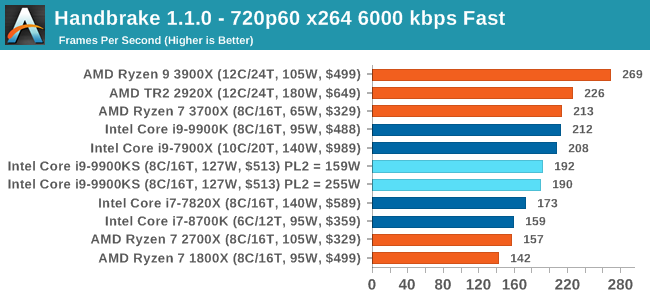
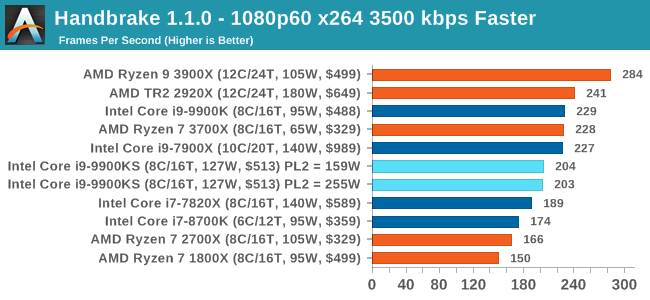
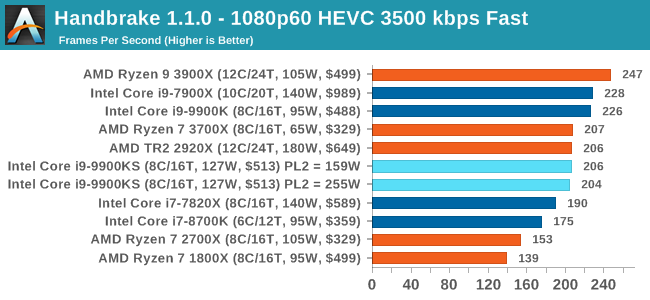
The 9900KS performed worse than our 9900K in our Handbrake tests, and we're not entirely sure why. It might be related to the regression we saw with DigiCortex.
7-zip v1805: Popular Open-Source Encoding Engine
Out of our compression/decompression tool tests, 7-zip is the most requested and comes with a built-in benchmark. For our test suite, we’ve pulled the latest version of the software and we run the benchmark from the command line, reporting the compression, decompression, and a combined score.
It is noted in this benchmark that the latest multi-die processors have very bi-modal performance between compression and decompression, performing well in one and badly in the other. There are also discussions around how the Windows Scheduler is implementing every thread. As we get more results, it will be interesting to see how this plays out.
Please note, if you plan to share out the Compression graph, please include the Decompression one. Otherwise you’re only presenting half a picture.
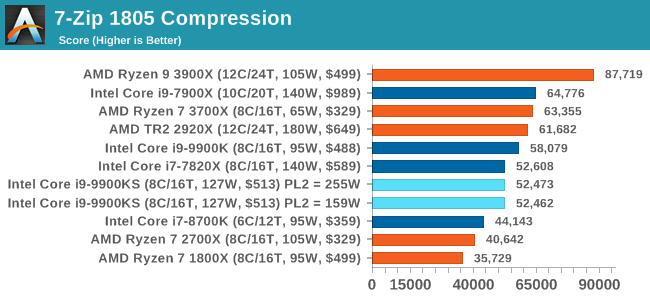
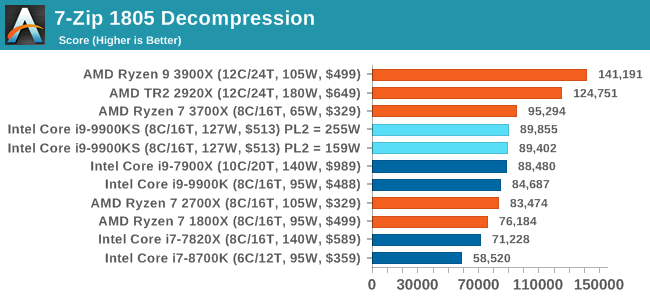
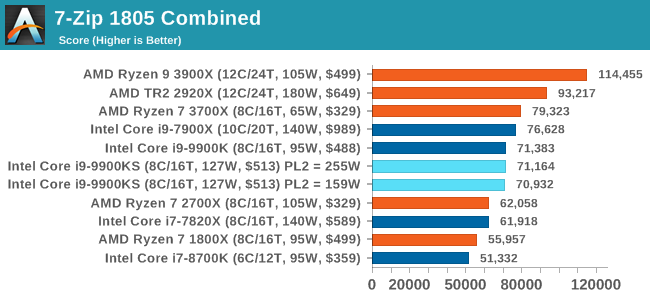
Both the 9900KS settings perform identically here, however the Compression test shows a performance regression compared to the standard 9900K. It does make me wonder if there are additional differences between the two chips (such as an internal clock).
WinRAR 5.60b3: Archiving Tool
My compression tool of choice is often WinRAR, having been one of the first tools a number of my generation used over two decades ago. The interface has not changed much, although the integration with Windows right click commands is always a plus. It has no in-built test, so we run a compression over a set directory containing over thirty 60-second video files and 2000 small web-based files at a normal compression rate.
WinRAR is variable threaded but also susceptible to caching, so in our test we run it 10 times and take the average of the last five, leaving the test purely for raw CPU compute performance.
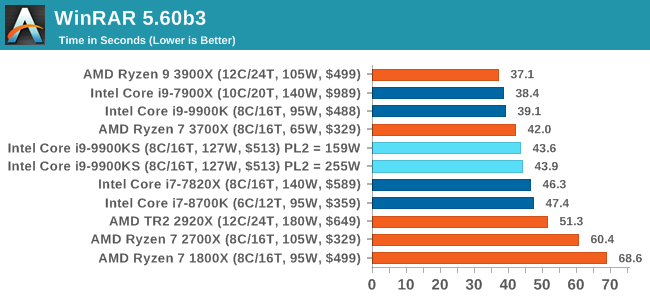
AES Encryption: File Security
A number of platforms, particularly mobile devices, are now offering encryption by default with file systems in order to protect the contents. Windows based devices have these options as well, often applied by BitLocker or third-party software. In our AES encryption test, we used the discontinued TrueCrypt for its built-in benchmark, which tests several encryption algorithms directly in memory.
The data we take for this test is the combined AES encrypt/decrypt performance, measured in gigabytes per second. The software does use AES commands for processors that offer hardware selection, however not AVX-512.
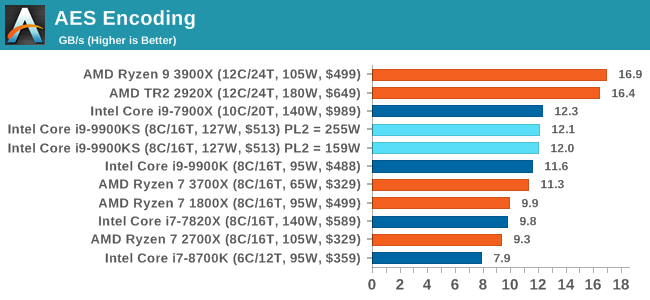










235 Comments
View All Comments
Jorgp2 - Thursday, October 31, 2019 - link
Did you actually read the article?Korguz - Thursday, October 31, 2019 - link
um.. it is a 172w cpu.... did you read it jorgp2 ?? intel tdp... is crap.. this is listed as being a 127 w cpu.. at BASE frequency. at 5ghz... it will probably use 172 w.. or morevMax65 - Friday, November 1, 2019 - link
Err...no...der8aur jus tested the 9900KS and it runs games all core 5GHz at between 98w and 126w....Video showing this starts at 3:50..It just depends on what you are doing and whether you are using heavy compute applications but for most games and normal day to day usage no it will hapily run under well under 172w... and that will never be an issue and that's really where this CPU is targeted...albeit those with deeper pockets...https://www.youtube.com/watch?v=YWSn0cHauJ4
Korguz - Friday, November 1, 2019 - link
what was his test setup ??? does it state that ?? i dont see how this chip can use less power. then its own siblings.GreenReaper - Saturday, November 2, 2019 - link
It's possible that it is if the chip is more power efficient (i.e. needs a lower voltage for a given load), which it has to be just to reach 5Ghz on all cores without sending power through the roofDigitalFreak - Friday, November 1, 2019 - link
Yep, I did. Their testing showed that all cores running at 5Ghz had the CPU using 172W. If you're not going to keep all cores running at 5Ghz, except during idle, what's the point of buying this over a 9900K?vMax65 - Friday, November 1, 2019 - link
I am not sure how you missed it but he clearly says when running CSGO, SOTTR and even Timespy GT1 and GT2 the CPU is always at all core 5GHz all the time with max power draw between 75w and a 126w.....He clearly states that at 4 minutes and onwards...The only time this CPU will draw max power of 170w is when you are doing heavy duty compute loads or testing with AVX...For normal use like gaming...this is what most people will buy it for it will never be at 170w plus..
Korguz - Friday, November 1, 2019 - link
again.. you dont state what the test setup was. how it was configured.. so, either he did something wrong, or anandtech did, and sorry to say, i trust AT more...vMax65 - Saturday, November 2, 2019 - link
Asus z390 maximus xi extreme, RTX 2080Ti and not sure what RAM...but as he cleary states this was during the bechmark runs and in the comments he covers forgetting to mention the 2080Ti but clarifies this point. Bottom line for 'normal' gaming usage this CPU will run all core 5GHz all the time at on or under 127w...vMax65 - Saturday, November 2, 2019 - link
And Anandtech tested power with Cinebench...not with games....